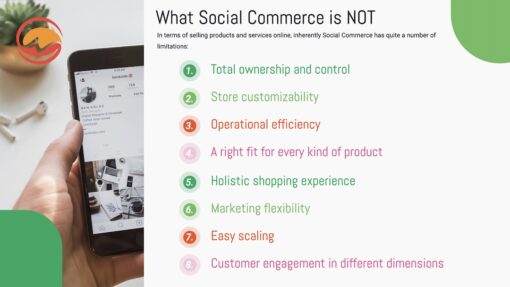Expanding your online business beyond Social Commerce

Irrespective of their industry, location, and company size, unarguably there has been a significant trend shifting or expanding from brick-and-mortar stores to online order across businesses. Many small merchants choose to start selling online through popular messaging apps and social media platforms. This a very smart and logical move. Without having to invest heavily in the beginning, it opens a window for merchants to first test the market and find out more about their consumer awareness and spending pattern. It also capitalizes on the power of social influence and create new opportunities for merchants to connect with customers. After all people on social media nowadays aren’t simply there to catch up with friends and family or share funny and bizarre videos. Many of them are there to shop.
Difference between Social Commerce and e-Commerce
Everyone is talking about Social Commerce is a rising growth channel. Some even say it is the king of the future online business. So what is Social Commerce? How does it compare to e-Commerce?
While e-Commerce generally refers to selling and purchasing products through a branded company website (or mobile app) or an online marketplace, social commerce is taking advantage of social media platforms like Facebook, Instagram or TikTok and their huge user base for selling products directly through their social media app. It’s essentially a mix of e-Commerce and social media management. No matter what, all of these platforms enable businesses to list and sell their products or services online. They are where customers can place their orders and pay. And in most cases customers can also leave written reviews (and ratings) to provide their views on their purchases. Be it positive or not, share their experience with other customers.
The social commerce market worldwide is expected to reach US$1,639b in 2024. Its impact is undeniable. It’s not all entirely about easy setup. Clearly it’s why so many businesses are doing their best to enter and optimize their capability in the social commerce space.
Yet despite all the facts, excitements and applauses we have, there is a lot of areas to improve and functionalities to add to make Social Commerce even more versatile. Let’s take a look into what Social Commerce is not built for.
What Social Commerce is NOT

Originally social media platforms were online communities for people to connect, communicate and share information. In terms of selling products and services, inherently it has quite a number of limitations:
1. Total ownership and control
When you sell on social media, practically you’re renting a space on a platform owned by someone else. You don’t have full ownership and control over your business and customer data there. To a large extent, you are subject to changes in algorithms or policies that could impact your product’s visibility and hence sales.
2. Store customizability
You have complete control over the design, layout, and branding with your own e-Commerce store. You can tailor the store in any way your want it to be; to reflect your unique brand identity and create a cohesive shopping experience for your customers.
3. Operational efficiency
No social media platform is designed and built with operational efficiency in mind just yet. They are just not the best tool for the job. And when your customer base and the number of sales orders grow to a certain size, the order fulfillment process can turn very bumpy.
4. It’s not a right fit for every kind of product
On average Social Commerce can be particularly effective for products that rely on visual appeal or impulse buys. Most common examples of impulse buys include fast fashion, apparels, cosmetics, shoes, toys for kids, home decors and household items. If you sell products that are relatively more expensive and have a longer purchase path, social commerce might not be able to increase your sales in a meaningful way.
4.1 Personalized and configurable items
Since we are talking about product fit, the products you sell on social media should be simple too. They should not have many variations and attributes to choose from. The more personalized and configurable the products are, the more complex checkout process it’s going to be.
There two issues for complex products. Firstly, they go against the principle of instantaneity of Social Commerce. And secondly is a technical shortcoming. The social media platforms simply don’t support them. That is a dead end. You can’t set them up properly and sell them on social media.
4.2 Virtual products
Somehow virtual products such as online course and gift voucher could be more complicated than complex products. It does not just need a customized checkout process, you need a system to keep track of their delivery and usage.
4.3 Comprehensive product presentation
With a traditional online store, you can provide detailed product description, high-quality images, and even product videos to showcase your products in the best possible way. This can help increase customer confidence and drive sales.
4.4 Extensive product range
Social media platforms are known for their ease-of-use and convenient UI design. There is no doubt they are great for showcasing products. However, many of them are limited in terms of how many products you can display. On the other hand, a traditional e-Commerce store allows you to offer an unlimited range of product selections, giving customers more options to choose from.
5. Holistic shopping experience
With your own online store, you can implement features like customer accounts, special promotion codes, price reductions, wish lists, product reviews, offer reminders and many more useful features to enhance the shopping experience. This can help build trust and loyalty with your customers, leading to increased repeat business.
6. Marketing flexibility
While social media is a powerful marketing tool, having your own online store allows you to diversify your marketing efforts. You can drive traffic to your store through multiple channels such as search engines optimization, email marketing, and of course any other social media advertising. The bottom line is even a simple WordPress website can help supercharge your business growth.
7. Easy scaling
As your business grows, you may need more advanced features and capabilities that any social media platform alone may not provide. With your own online store, you can easily scale up by adding new features such as a loyalty program, integrating with third-party apps and services, and even expanding into new markets or product categories.
8. Improved customer engagement (in different dimensions)
e-Commerce allows businesses to gather data and carry out analysis on customer preferences and behavior. Based on the findings, you will be able to create, fine-tune and engage with customers with more personalized marketing and targeted promotions
Which one is right for you?
By now we have a deeper understanding of the differences between Social Commerce and having your own e-Commerce store. They both come with some unique advantages and challenges. You need to review your product categories, target audiences, marketing strategy and long-term goals to determine what is best for your business.
However, the choice of your online sales channels is not binary. The ultimate approach may involve a combination of both Social Commerce and your own e-Commerce store. You can use social commerce to list a sub-catalog, increase brand visibility, drive traffic to your website, and complement your overall marketing efforts. Then use your e-commerce store as a central hub for transactions, customer support, and brand engagement.
Expert e-Commerce advice and guidance
To learn more about taking and growing your business online with Wavyos Technologies, contact us today for a free consult. Our team has years of valuable and solid experience in creating high impact websites, e-Commerce stores and Search Engine Optimization (SEO). We do not just give you a good-looking website, we deliver you with a very powerful online tool to grow and expand your business.
Email: [email protected]
WhatsApp: +852 6099 4407
Topics that you might be of interest to you:
- How To Drive Online Sales with Great Product Showcase?
- How to do SEO for WooCommerce?
- Let’s talk about Image SEO
- Selling Your WooCommerce Products on TikTok is Never Easier
- Why should you choose WooCommerce over Shopify?
- How to pick the best domain name?
- What is a SEO-Driven Website Plan? Why is it important to the success of making a new website?
